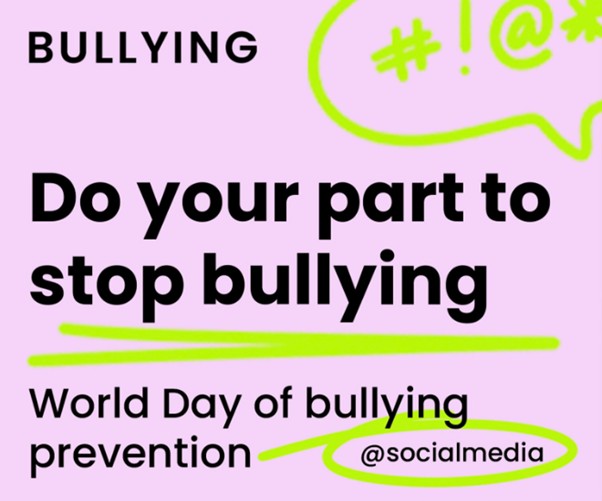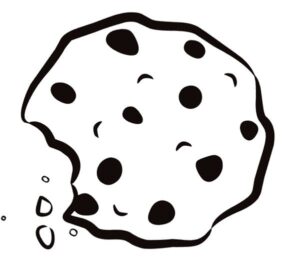“Sticks and stones may break my bones but words will never hurt me”… mmm… don’t think so!
Something happened to change a wide-eyed, confident, fun-loving girl with pigtails into a self-doubting, anxious teenager whose most dreaded part of the week was Sundays. I couldn’t have been alone in having a sinking feeling particularly on Sunday nights. The fact that I then became a teacher and committed to a lifetime of similar dread is somewhat baffling. In my teenage years, it robbed me of my whole day. In fact, the only day I remember being happy is Saturdays, when I felt like the real me for a short while.
What was it that happened?

On attending a ‘less than reputable’ secondary school (which far from ideally, Mum also taught at), I was somewhat of a jigsaw piece that didn’t fit. I started with optimism, having been part of the ‘popular’ group at primary school. My friend was by my side and I had no reason to doubt that all would not be well. Sadly, this episode of my life led to a loss of my confidence, self-esteem and ultimately my joy – was slowly eroded away.
20% of adults state that they were bullied in school apparently. I’m not here to argue with statistics, but I do know that bullying can vary in severity. No form of bullying, even occasional, is right of course, but when you are relentlessly subjected to it for years and it is ignored and brushed under the carpet, its effects are truly life-altering. The attacks to which I was subjected, (only ever verbal), took far longer to recover from. Indeed I would say that still, to a lesser degree, can be prone to feeling ‘less worthy’ than others, a mindset that never existed in me prior to being 11.
11 year old me wasn’t Einstein, but I was bright and incredibly hard-working. Combined with being a teacher’s daughter, I guess I was a prime target. That said, I believe (hope) that the same set of factors would not in today’s climate mark you down as being a potential victim. Other ‘reasons’ individuals may be bullied have been cited as: being overweight, being underweight, wearing glasses, having freckles – physical judgements made without any other justification. But equally, I have known people to be bullied for being pretty, clever, popular, ‘nice’. Whatever the perpetrator’s reason, it is never justifiable, and I would argue is almost always down to their insecurities and jealousy. All this is easy to say as an adult, long removed from the situation, but was desperately hard to accept when in the midst of it. My ‘life glasses’ allow me to see it from the perspective of a teacher and a parent and I know what that happened to me was utterly unacceptable and should have been ‘stamped out’ rather than allowing me to be ‘stamped down’.
Daily jibes, whispered taunts and looks of hatred were something I just became used to, only on one occasion, snapping back.
How I wished the 51 year old me could ‘do a Dr Who’ and teleport back to the classroom where I would confidently and categorically defend myself?
This kind of justice will never be awarded, the only ‘comeback’ I had was to survive and succeed regardless, even though my inner spirit would always have been diminished to a degree by what happened to me during those 3 years. I suspect I was not the only one she victimised, but I do wonder how her hatred for those not in her ‘inner circle’ was allowed to prosper and with every time it was ignored, her power grew. Yes, there is unresolved anger at how she behaved, but there is more at the system that ignored it. On reflection, I was reluctant to speak about the true extent of it all. For the result of bullying is that it undermines and erodes confidence, therefore we are even less empowered to use our voices and seek help. One particular lesson is etched in my memory, where a bad situation was made 100 times worse by a teacher who was – at best, ill-considered and at worst, unforgiveable. When he uttered: “Why can’t everyone be like Joanna?”

In a school culture where it was most definitely not cool to be clever, this remark led to increased resentment and further attacks. There was also an element felt by many of “telling will make it worse”. Having worked in the education system for so long, I do not believe this to me true. Many schools have superb systems in place, such as being a ‘telling school’, ‘circle of friends’ and ‘restorative justice’. Indeed, I have instigated some of these with great success. Schools are spot on in admitting that bullying can happen in any school. It is how it is dealt with which matters.
My own experience as a teenager enabled me to work passionately to create a culture where any attacks on others would be dealt with swiftly and with honesty. Sadly though, the nature of the beast is that these ‘predators’ know how to stalk silently. They can be clever in disguising their behaviour and this can be much harder to deal with. The bully I encountered was openly vocal and it was still ignored. When I have encountered this as a professional, it has literally broken my heart. I have led assemblies in ‘Anti-Bullying Week’ where I have laid my story wide open to the pupils sat before me, sharing my experience in the hope that they will;
- Think twice before treating anyone that way.
- Tell someone if it was happening to them.
- Support someone if they see they suffering.
We must not assume that leaving school ensures the end of our vulnerability. For some, the workplace is also a place where their confidence is eroded, they can feel vulnerable or victimised and I would argue that this is even harder to address when dealing with adult perpetrators. It is not like you can administer lines or a lunchtime detention! In fact, the same percentage of adults state they have been subjected to workplace bullying as children in school.
For me, I developed a backbone of internal steel, which spurred me onto to not be broken by attacks from others. Not that there would be quiet tears at times, feelings of fear, but I was vehement in not showing it and for every act to undermine me, I fought back stronger.

As teachers we have a duty to promote kindness in schools.
There are countless quotes about how bullying can and must be overcome, but I will close with this thought;
“No one can make you feel inferior without your consent” – Eleanor Roosevelt.
Blog written by Jo Gotheridge 17 .9.25

So very true! Bullying has life long effects. As a teacher we are in a unique position to call it out where it happens. It is also worth remembering that children who do the bullying are often feeling powerless in their home situation.
Its so true and very sad, that despite all the awareness and teaching, it is still so commonplace. I was completely shocked at the comments that children were prepared to put online- there seemed to be a sort of competition as to who could say the most vile thing about another person. This could be due to the child’s lack of self-esteem, but I have also felt that much of society is seeking drama and sadly this is sometimes modelled to children by their parents and often by the media.
Yes, I feel very grateful that when I was bullied as a child, when I was at home I was safe and it couldn’t continue via a phone or online. I will continue to work passionately on promoting anti-bullying initiatives and kindness as it is so damaging. And it is even more shocking it can still happen with adults in workplaces. We should work to support and encourage each other not bring each other down.